One From The Heart
"It was good for me, it disciplined me, it made me - I had to sit in a little room and they'd ring me up on the phone and put memos under my door - it was like working in an office. Builds character, I think the lock was on the outside of the door, not the inside, they were afraid I was gonna go to Acapulco."
Late 1979 Waits had reached the low point of his life. A planned movie project with Paul Hampton was not going to happen. His contribution to Sylvester Stallone's Paradise Alley was reduced to a minor cameo. In spite of all the touring Blue Valentine had not turned into a commercial success. In May Waits tried writing his next album (to be released late 1979) but it just didn't work. He was fed up with the music industry and its money oriented business men like Herb Cohen. He was disappointed, disillusioned and trying to get a grip on life. The Tropicana had turned into an amusement park for rockstars. Waits had released 6 albums with only minor success, he desperately needed a change.
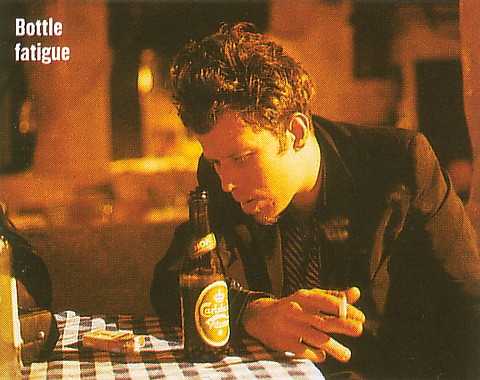
Waits early 1979. Credits: photography by Tom Sheehan(1)
So in October/ November Waits fled to New York, looking for a new environment, wanting to challenge himself, maybe looking for a new producer (Jack Nitzche). Waits was in a crisis. He was sick, and he had to fight some serious addictions. For the first time since his debut, there was not going to be a new Tom Waits album that year.
Tom Waits (late 1979): "I'm looking for something that can keep me home a little more often, cause the traveling is starting to turn me into a real irritable guy. you know? - You know, all the traveling it's just not eh- well it's just THIS side of a thrill, you know? - I just would like to try and cut down on it, you know? And stay home a little more often. And work on some projects there- And I'm just getting tired of hotels and cabs and station wagons, you know? ... I'm really kind of ehm- poised on the threshold on some sort of a new direction. I'm working on eh& ehm something called "Heartattack And Vine" right now. It's a new project, but eh- Yeah, I'm looking for something that's a little more refreshing for me, you know? Getting a little tired of growling and scratching the back of my neck, you know?"(2)
Tom Waits (1981): "I just got totally disenchanted with the music business. I moved to New York and was seriously considering other possible career alternatives... The whole Modus Operandi" - he made it sound like a particularly militant branch of the Casa Nostra - "of sitting down and writing, and making an album, going out on the road with a band. Away for three months, come back with high blood pressure, a drinking problem, tuberculosis, a warped sense of humour. It just became predictable." (Source: "Heart Of Saturday Morning" Melody Maker. March 14, 1981 by Patrick Humphries)
Tom Waits (1982): "I felt I'd painted myself into a corner. I'd fallen in with a bad crowd and needed a new landscape, a new story."(3)
Robert Hilburn (1999): "Waits moved to New York around 1980, partly to shed some of the hard-drinking L.A. habits, even enrolling in a fitness class. Smiling as he recalls an image from that period, he says, "I was running down the street to the Y to work out and I had a glass of alcohol in one hand, with some aluminum foil over it so it wouldn't spill, and a cigarette in the other hand,... and I realized I was kind of coming apart."(4)
Waits traveled back to Los Angeles to attend a private New Years party. Apparently this is where he first met his future wife Kathleen Brennan. But Waits didn't stay, he returned to New York...
Art Fein (2003): "In late 1978 some friends and I began producing private New Years parties, and Chuck and Waits came to the first two. Tom met his wife at the second one, which featured Roy Brown."(5)
Jay S. Jacobs (2000): "Bones Howe believes that the real reason Tom chose Manhattan as his new base of operations had nothing to do with scenery changes or shoes or a quest for fresh watering holes. He admits, "You know, Tom did go to New York and try to work with another producer. I was aware of that. He did some demos and stuff. He came back and we talked a lot about what he wanted to do. It was between Blue Valentine and Heartattack And Vine." While in New York, Waits attempted to come to a meeting of the minds with Jack Nitzche and several other producers, but it just wasn't happening for him. None of it - neither the producers nor the city itself. New York, New York may be a wonderful town, where the Bronx is up and the Battery down, but Tom Waits was feeling a little lost."(6)
Tom Waits (1980): "Yeah, I had some plans to explore new producers. I'd moved to New York for about five-six months, wanting to challenge myself with an entirely new environment. But my relationship with Bones has been a very close and personal one. That for me is more important than anything when you're in the studio - to have somebody you can trust and who knows you, knows who you are and doesn't let you get away with anything. I didn't really want to disturb that relationship. But at the time I thought I wanted to change everything."(7)
Early 1980 Waits didn't tour and didn't do any interviews. There is however a hilarious yet upsetting radio appearance from February 1980, for "Radio-Radio" on W-PIX 102 radio in New York. Waits sounds like he's on dope. Gary Tausch (Tom Waits Miscellania) puts it like this: "If Tom had a hard drug period, this was probably it and he sounds somewhat wasted but it's hard to tell." (Raindogs Listserv discussionlist. May 27, 1998). In New York, early 1980, Waits needed a miracle... In the meantime, back in Los Angeles, Francis Ford Coppola was thinking about his next project: One From The Heart. One From The Heart was to be the antidote to Coppola's Apocalypse Now.
Francis Ford Coppola (2003): "That film had been so tough; so thoroughly frightening; so strange in it's exploration of morality that I wanted very badly to make a film that was its opposite. Something more like a fable; more like the musical comedies I used to direct in college."(8)

Coppola needed a writer to provide the music score for the upcoming project. Coppola and Waits hadn't worked together before and Waits had only little experience with soudtracks (Paradise Alley, Bad Timing, On The Nickel). Still, in April 1980, Waits got a call. Coppola wanted to talk about Waits participating in the project. Waits got his miracle...
Q (1982): "How did you first become involved with Francis Coppola and One From The Heart?"
Tom Waits: "When I was in New York back in April of 1980, Francis was there auditioning people he wanted to be involved with the film. Somebody had sent him my records and Francis liked the song "I Never Talk to Strangers," a duet I'd done with Bette Midler [on Waits' Foreign Affairs LP released in '77]. He liked the relationship between the singers, a conversation between a guy and a girl in a bar. That was the impetus for him contacting me and asking me if I was interested in writing music for his film."
Q: "Why did you decide to do it?"
Tom Waits: "Because I looked forward to the challenge. I needed something to stimulate my growth and development. The sole process of making music that would adhere to film was still something new to me. So it was a little terrifying. But working with Francis seemed like a good opportunity."(9)
Tom Waits (1982): On living New York in 1980 "It was 30 below. I was paying $600 a month for a miserable little apartment and I spent $300 on locks for my doors, because I was constantly worried about burglars. One of my neighbors was this Yugoslavian lady who wore black pajamas and sticks on her back... I was rescued from this situation by Francis."(3)
Larry Blake (1982): "Work on the music score was being conducted by Tom Waits and his long-time producer, Bones Howe. Howe, whose engineering career dates back to 1956, and who produced Sixties classics by The Association, the Turtles, Elvis Presley, and The Fifth Dimension (among others), recalls his first contact with One From The Heart: "In the original meeting that Tom and I had with Francis [Coppola] he said, 'What I really want you guys to do is go make an album called "One From The Heart," and then I'll make a movie that goes with it.' In fact, we didn't work exactly that way, because Tom is not the kind of guy who sits down and writes on cue. He needs stimulus and inspiration and time. To write a dozen songs loosely to Francis' specifications was a big order, and was something that Tom had never faced before... Francis picked Tom because of an album called Foreign Affairs we had done, specifically a duet on it with Tom and Bette Midler called 'I Never Talk to Strangers.' It's a mini-story, a vignette of a guy and a girl sitting at a bar who start talking. She finishes every line by saying, 'But I never talk to strangers.' The concept of what the music for the film would be like evolved out of that, like it was happening at a piano bar; a lounge act kind of thing. Some of the music had strings added to it later to fill it out, and also to give it a more romantic feeling in places of the film where it needed that 'Hollywood' tug. But, by and large, the ensemble was Tom Waits and Pete Jolly on piano, Greg Cohen on upright bass, Shelly Manne on drums, Teddy Edwards on tenor saxophone, and Jack Sheldon on trumpet."(10)
Waits returned from New York to Los Angeles late April/ early May 1980. There at Coppola's Zoetrope studios, he was given an office of his own. Waits (at that moment probably out of touch with Rickie Lee Jones and Chuck E. Weiss) was at a turning point in his life. Waits started working early in pre-production (before filming started), the project kept him occupied through 1980 and 1981 and it gave him an opportunity to clean up and get organized. Waits was rescued...
Tom Waits (1974): "It was terrifying when I realized the urgency of the conditions - that so many people were depending on the musical decisions I made, because the music was going to be woven into the fabric of the piece and the singers were integral characters in the development of the story. I was writing music for scenes that hadn't been finished, and they were developing scenes for songs that hadn't been written - leaving space for an alleged musical number with no real designated form. Traditionally, films are cut and then the music is arranged to fit in, but that wasn't the case here. At the end, they had to tear the back off the film and push the music through the rib cage."
Tom Waits (1982): "There was never any gospel script. There was a blue print, a skeleton. And right out front, Francis explained that the story would be changing as the production unfolded. But before I started writing anything, I met Francis in Las Vegas. In a hotel room, he took down all the paintings off the walls and stretched out sequences of events and would spot, in every rough, cryptic notations, where he wanted music. It was helpful. I was able to get an idea of the film's peaks and valleys."(9)
Tom Waits (1982): "It's my first experience in writing as something as large. And eh a tremendous responsibility and eh it's terrifying. But I accepted the challenge and eh... I guess I became perhaps more disciplined as a composer. And also I had to learn how to work with a variety of different kinds of people from different eh... It's like a, it's like a school you know? So that aspect of it was very different for me in having to create a piece that was going to then again fit on another piece that was gonna fit on another piece... "(19)
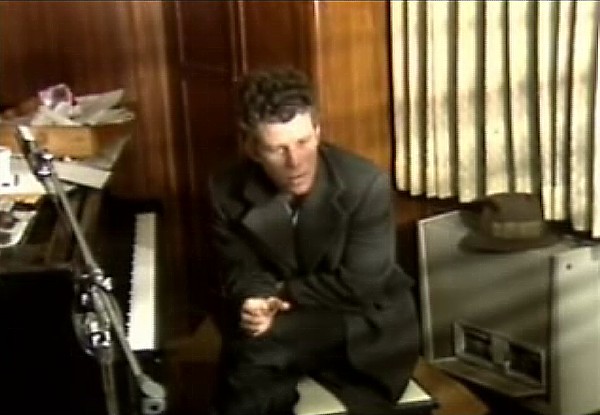
Still from the 2003 One From The Heart DVD. Date: Hollywood, Zoetrope studio's. 1980/ 1981.
Credits: "One From The Heart on DVD". Copyright � 2003 American Zoetrope
Somewhere between April and August 1980 Kathleen Brennan walked in, who Waits had met before at Art Fein's New Years Eve party. Apparently Brennan was script-analyst at Zoetrope studios (unverified). Waits and Brennan fell in love. In the summer of 1980 Waits took a month off and moved in the RCA building on Ivar and Sunset to record the album Heartattack And Vine (June 16 - July 15). He had been working on these songs since late 1979. Heartattack And Vine has the song "Jersey Girl", which (one might assume) was written in New York and later dedicated to Kathleen Brennan. Thomas Alan Waits and Kathleen Patricia Brennan married August 10, 1980.
Tom Waits (1998): "I wrote it for my wife, she's from Jersey, well she's originally from Illinois, she moved to New Jersey, and she grew up there, Morristown, New Jersey, and so I wrote it for her when we met, and eh, so.. eh."(11)
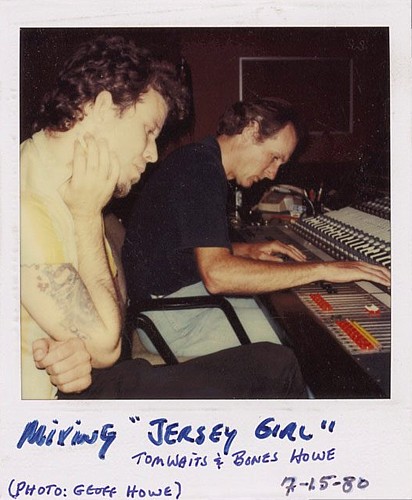
July 15, 1980 (w. Bones Howe). Credits: photography by Geoff Howe(12)
Heartattack And Vine was released in September, but Waits wasn't going to tour. Actual recordings for the score for One From The Heart started October, 1980.
Larry Blake (1982): "Tom Waits and producer Bones Howe began their work on the film's music early in pre-production. Actual recording began in October 1980 three months before filming started. As Bones Howe explains, "Everything at that point was 'Try it on and see how it fits.' It ended up being that way throughout the whole film because, in fact, Tom never wrote a piece of music for any specific place in the film. The film kept changing so there was a constantly updated video version being made... Sometimes we would go in the studio and lay down a demo on two-track so that Tom could have a tape to take home and listen to. Often it was just a melodic segment with Tom, on piano, and his bass player. A lot of that stuff ended up being considered for the final film because we couldn't recapture on 24-track the mood that we got the first time through. The song 'Broken Bicycles' in the film is, in fact, a two-track demo of Tom singing and playing piano, and Greg [Cohen] playing upright bass. It was done at the end of a session where we had recorded other music, and Tom said, 'Let me get this down on tape so I can listen to it.' We didn't even bother to make a 24-track of it because we assumed it would be re-recorded with a huge string section later, which in fact it was. But we ended up using the original two-track because with the big string section it ended up sounding too dramatic."(10)
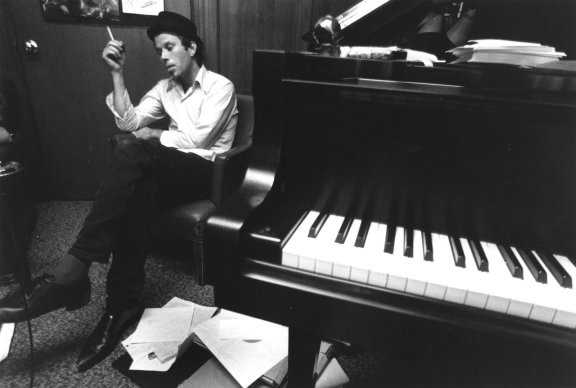
Hollywood, Zoetrope studio's (One From The Heart recordings). 1980/ 1981.
Credits: photography by Henry Diltz(9)
Bob Alcivar (2007): “Tom would come over to the house, put his hands on the keyboard, and say, 'Now that's it. He'd say, 'I don't know what the chords are but that's the beginning of the song.' I learned a lot from this, because Tom was doing things that were out of school and had nothing to do with education or music theory. He was just doing it from the heart and soul."(20)
Tom Waits (1982): "We had musical summit meetings periodically at Francis' place in Napa. I'd sit at the piano with a brandy snifter and Francis would try and set up little dramas, to begin a musical dialogue about romance, and I'd syphon out ideas. It's very difficult working with someone who has a vision, especially Francis' four-dimensional vision, when you are required to implement it. He'd come in and start to brain-storm musically, skull out things, give me some borders and horizons. But he didn't want to put his hand in my hand. He wants your expertise in your area. In my case, he wanted me to create this pile of music that he could then take and throw up against a wall and see how it hung."... "To come up with right musical atmosphere, I worked very closely wit Bob Alcivar, the arranger and orchestrator, and Bones Howe, my album producer. And Richard Beggs, who was really the sound sculptor, would sit in a little room, around the clock, with a catalogue of musical cues. Richard was the one most responsible for getting all the music to mesh with the film."..."I never knew when the script was going to change, or where in the film the songs would end up. Once shooting began, I looked to the film for some direction, but I could never rely on it. If I would try and write for a specific scene, the scene might only be in there for a couple of days. So the music would rapidly become obsolete. I finally resigned myself to following Francis' original suggestion: "Write anything and we'll find a place for it."(9)
Bob Alcivar (2007): “Alcivar worked closely with Waits on arrangements of the One from the Heart songs, scoring them for jazz trio or quintet, for a Basie-esque big band sound, or symphonically for orchestra. He esti¬mates that over the course of the following months they recorded as much as six hours of music. The earliest material for the One ftom the Heart soundtrack was recorded in October, six months after Waits began work on the film... For the film's core group, Waits and Bones Howe assembled a team of veteran players from the glory years of West Coast jazz. An awestruck Greg Cohen, the baby of the band, found himself surrounded by such leading lights of the California "cool jazz" era as pianist Pete Jolly and (returning to the Waits fold) drummer Shelly Manne and trumpeter Jack Sheldon. Tenor sax legend Teddy Edwards, who'd played with Waits back in 1975, had been a leading light of Central Avenue bebop in the 1940s before joining Howard Rumsey's Lighthouse All Stars in Hermosa Beach in the following decade. "The house group was Jack and Teddy," says Bob Alcivar. "Tom said that was the sound of this movie. No matter waht else was going on, there was always Jack or Teddy"(20)
Crystal Gayle was chosen to be Waits' singing partner. Coppola originally wanted Bette Midler to sing with Waits.
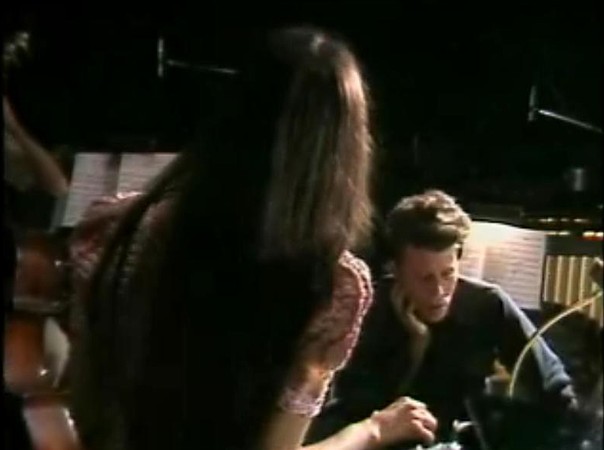
Still from the 2003 One From The Heart DVD. Date: Hollywood, Zoetrope studio's. 1980/ 1981.
Credits: "One From The Heart on DVD". Copyright � 2003 American Zoetrope
Jay S. Jacobs (2000): "The official word was that Midler would not participate in Coppola's project due to "scheduling conflicts;' but that entertainment-industry catchphrase conveys only a grain of truth. When Bones Howe floated the suggestion to Midler's people, he discovered that the Divine Miss M. had some serious reservations. She was working on a concert film called Divine Madness, and she'd recently acted in her first film, The Rose, in which she played a boozing, pill-popping, self-destructive rock diva, loosely based on Janis Joplin. It was an impressive debut, the film had been well received, and Midler also had a smash single with The Rose's title track. Her second film would be jinxed, a failed attempt at pitch-black romantic comedy, costarring Ken Wahl and Rip Torn, that would effectively stop Midler's acting career dead in its tracks for about four years. At this point, however, she sensed that she was riding her wave of success straight to the top, and she was a busy, focused woman. "We went through all sorts of gyrations because [Coppola] wanted Bette to be there," Howe maintains. "I called Bette's manager and he said, 'Bette doesn't want to sing in a movie that she's not acting in . . .' [I said], 'But she's going to be the voice of the movie. The same voices are going to be through the whole movie. It's a great opportunity for her. She's going to be working with Francis Ford Coppola. 'He said, 'She's a bigger name in film than Francis is.' I said, 'Jerry, if you believe that, she shouldn't do the movie.' That was the end of it."(13)
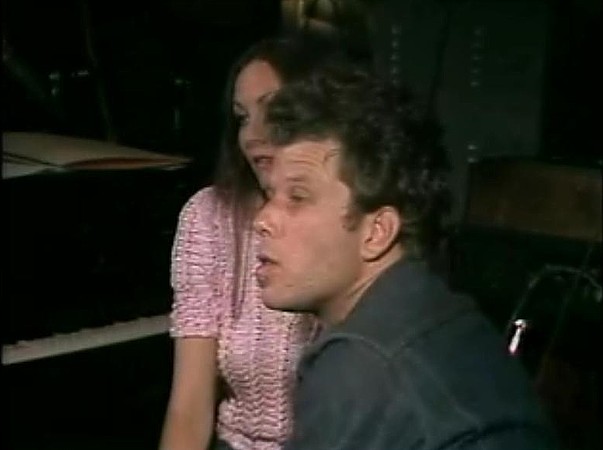
Still from the 2003 One From The Heart DVD. Date: Hollywood, Zoetrope studio's. 1980/ 1981.
Credits: "One From The Heart on DVD". Copyright � 2003 American Zoetrope
Tom Waits (1982): "It was a collective decision. There were a lot of candidates. Bette Midler was originally going to be involved, but there were some scheduling conflicts. So we kept throwing names around. Then, when my wife and I were on the road, we heard Crystal sing "Cry Me A River" on the car radio. I really liked her rendition of that. So, ultimately, Crystal became involved and she worked out real well. She was nice and easy to work with."..."Is there Any Way Out of This Dream?" and "Take Me Home" were written for Crystal to sing. "Old Boyfriends" was originally for me, then for her, then it turned into a duet. "Picking Up After You" and "This One's From the Heart" were written as duets. I found that it was hard writing for a woman. There are certain words they're uncomfortable with. I can get away with a certain vernacular, while a woman singing it would have trouble. I had to change things around, put everything into her words. It was tough. I felt like I was writing lines for an actress."... "Little Boy Blue," was originally a song I was singing. Just another song in the movie. Then they cut it, sliced it up and adapted it for her to sing."(9)
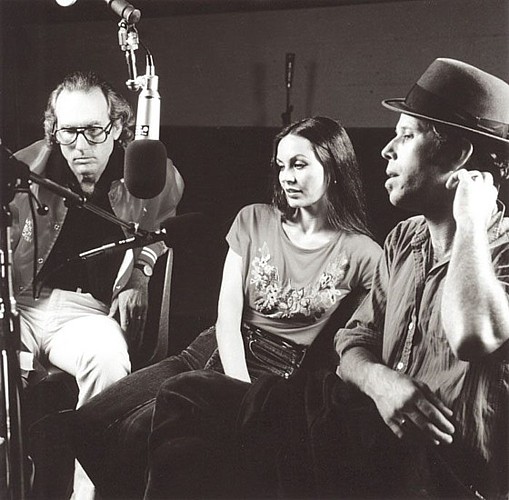
Hollywood, Zoetrope studio's (One From The Heart recordings w. Bones Howe and Chrystal Gayle). 1980/ 1981.
Credits: photography David Alexander(12)
Waits worked on the project from May 1980 to September 1981. In between he took some time off to record Heartattack And Vine and to do some short tours (November 1980: USA/ Canada tour, March - April 1981: European tour).
Tom Waits (1982): "It was necessary at times to take a little sabbatical from my work on One From The Heart. I needed to get a little distance from the film periodically. So I toured a couple of times, just a few shows back East and in Australia. I wasn't used to concentrating on one project for so long, to the point where you start eating your own flesh."(9)
Apparently when in Ireland the newlyweds honymooned for a couple of weeks.
Tom Waits (1981): "My wife's part Irish. Brennan. So we spent our honeymoon crawling up and down the shoulders of Ireland for the last three weeks. Best thing that ever happened to me... We stayed in an old house, used to be owned by William Blake. Radio was busted, so we called down to the guy on the desk but he'd gone to get parts for the radio. Didn't come back for four days. Just great. They live at my level of incompetence. We fit in real well there."(14)
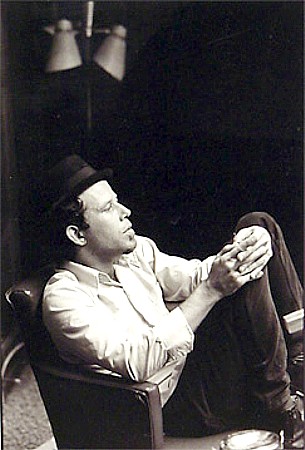
Hollywood, Zoetrope studio's (One From The Heart recordings). 1980/ 1981.
Credits: photography by Henry Diltz(15)
The recordings for One From The Heart (at Wally Heider recording studios, Hollywood/ USA) were finished September, 1981.
Tom Waits (1981): "I've been sweating bullets since April (1980), I've never worked on anything as challenging as this, having to conceptualize and design the musical fabric of an entire story. But those are the real rewards when it comes down to it - working with someone like Francis who has so much insight and daring. Sitting down with someone like that over a glass of beer, talking about film, exchanging ideas, knowing you're making a contribution - that makes you feel you're really going somewhere."(16)
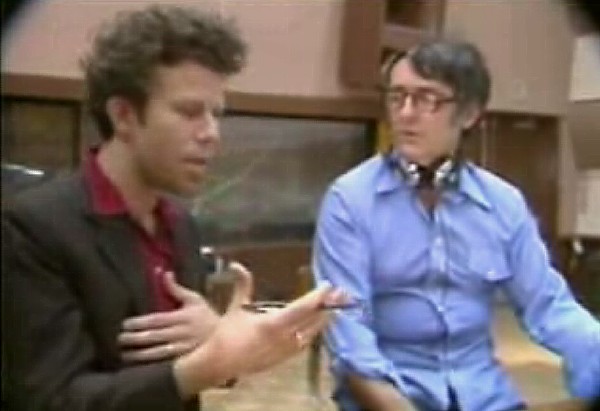
Still from the 2003 One From The Heart DVD. Date: Hollywood, Zoetrope studio's. 1980/ 1981.
With Bob Alcivar.
Credits: "One From The Heart on DVD". Copyright � 2003 American Zoetrope
Tom Waits (1983): "I worked on One From The Heart for almost 2 years from actual inception to release so it was a long project You're working with so many other people, you're not on your own, it's an enormous committee, you have to learn how to communicate and cooperate and I put on a suit and tie, shaved, read the paper, had a cup of coffee and went to work along with millions of other Americans. That wore off. No, it was good for me, it disciplined me, it made me - I had to sit in a little room and they'd ring me up on the phone and put memos under my door - it was like working in an office. Builds character, I think the lock was on the outside of the door, not the inside, they were afraid I was gonna go to Acapulco."(17)
The $26 million production of One From The Heart opened in the US and Canada, February 1982 to lukewarm reviews. Apparently Coppola pulled the film two weeks after its opening because of concern that studio politics and industry media chatter was spoiling the film's reputation. The music score for One From The Heart was nominated for an Oscar (1982). Waits even attended the presentation of the Acadeny Awards at the Dorothy Chandler Pavilion, Los Angeles (April 11, 1983). However, the award went to Leslie Bricusse and Henry Mancini for "Victor/ Victoria". The film had its long-overdue opening in the UK, July 1983 and The Netherlands, October 1983.
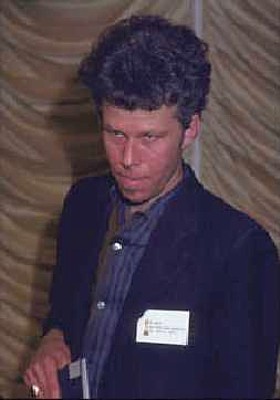
Waits at the Academy Awards. Dorothy Chandler Pavilion/ Los Angeles. April 11, 1983.
Credits: photography by Frank Edwards (Fotos International/ Archive Photos)
One From The Heart turned out as a financial disappointment. Reeling from the failure of One From The Heart, Coppola was pushed to the brink of bankruptcy as his debts vaulted to a staggering $30 million. The soundtrack album sat on a shelf for months until legal wrangles were sorted out. It was released in Europe by CBS (Colombia Records/ Sony Music Entertainment) early 1983.
Jay S. Jacobs (2000): "Bones Howe had negotiated a one-off deal with CBS Records to release the One From The Heart sound track, but the idea didn't sit well with Tom. Bones remembers that Tom called him and said, "'I don't want to give them the sound-track album. 'I said, 'Why? 'He said, 'I think it's too commercial Hollywood. I think what I should do is I should just sit at the piano and just sing all those songs. The sound-track album should just be me singing the songs from One From The Heart by myself at the piano.' said, 'Well, Tom, that's not what CBS bought.' So Tom went to Francis, and Francis said, 'No, I don't think that's what we should do. We should put all the sound effects into the soundtrack album from the place where they are in the movie. The soundtrack album should be like a little audio minimovie.' So it turned into this huge brouhaha about all that, and finally CBS just kind of threw up their hands and said, 'Well you guys just figure out what you're going to do."'... Soon enough, though, the decision was made for them. Coppola had set up a New York preview screening for One From The Heart, and the critics in attendance gave it a big thumbs down. The word was that Francis Ford Coppola had followed up Apocalypse Now, a modern masterpiece, with a stinker. The love story was confusing, the characters were cyphers, and the happy ending felt tacked on. One From The Heart was rushed back to Zoetrope for some hasty surgery, but the damage was done. By the time it was released, One From The Heart was doomed to failure. Says Howe, "Then, of course, the guy from CBS called me and said I'm not going to put out a soundtrack album from a stiff movie. So there that soundtrack album sat for six or eight months,"& While the film itself was almost universally panned, few had a bad word to say about the soundtrack. Many felt that what Waits had achieved was truly amazing. "Picking Up After You" and "This One's from the Heart" were rightly heralded as small masterpieces. Critics and music execs alike praised the score - the only problem was that only those who bought a ticket to see the movie could hear it, and few, apparently were willing to go that far. About eight months after the film had fallen on its face, Bones Howe finally saw an opportunity to deliver the music directly to the people. When he discovered that One From The Heart was about to be released in Europe, he quickly got in touch with Coppola's attorney, who had worked out the original contract with CBS, and said to him, "Francis Ford Coppola in Europe is like Truffaut is here. He's a God. You call [CBS] and you tell them that [One From The Heart] is going to come out in Europe. If the foreign division of CBS finds out that there's a soundtrack album in the can and they're not going to release it, there's going to be a lot of heat." So the attorney put in a call to CBS and asked them if, given the circumstances, they were going to release the One From The Heart soundtrack in Europe. The answer was, "We don't know," so Howe announced that he would contact CBS in England and tell them all about it. "And it's amazing," he says. "It worked! You know, you just kind of dream these stupid things up and figure, well, if this is the showbusiness game, I'll play the showbusiness game. But fear really works ... They said, 'Well, how do we do this?' I said, 'You have a Tom Waits and Crystal Gayle album. That in itself should be worth something to you.' That's what they did. They just flipped the covers, put the front on the back and the back on the front. Called it Tom Waits and Crystal Gayle Sing Music from One From The Heart."(13)
By Robert Hilburn
Nine months after Francis Coppola's $27.5 million "One From The Heart" opened with such sweeping expectations, the sound-track album has finally arrived in the stores. Compared to the hoopla that would have accompanied the LP's release in February, however, the collection of Tom Waits songs has been all but sneaked onto the shelves by Columbia Records. That's too bad because "One From The Heart" is the most engaging sound track so far this year. Its best tunes (mostly found on Side 1) abound with a sophistication and style that are rarely found anymore in Hollywood musicals. The elegance and detail in the songs convey marvelously the lavish emotional shadings of Coppola's romantic fantasy about ordinary people climbing into and stumbling out of their grandest dreams. Sample lyric:
I can clearly see nothing is clear
I keep falling apart every year
Let's take a hammer to it
There's no glamour in it
Is there any way out of this dream?
So why did the album sit on the shelf for nine months? When asked about the delay, album producer Bones Howe sighed deeply and replied, "You got a few minutes?"
The first version of the "One From The Heart" sound track was ready before the much-anticipated film officially opened in February and, Howe insists, Columbia Records was "Thrilled with it." With all the publicity being generated by the film, the album shaped up as a hot item. But Coppola objected to the album, Howe said. "From the beginning, Tom (Waits) and I wanted to put out an album of songs," Howe said. "We didn't want the typical sound-track album where you just have one or two songs and a lot of instrumental score. "But Francis wanted more of the sound and feel of the movie in the album. He wanted the sound of the gambling tables and the sound of the street. He also wanted the songs linked thematically like Sgt. Pepper's"
Fearing the changes would reduce the album's commercial potential, Howe argued against any revision. This disagreement led to a confrontation scene equal to the best screen dramas, the record producer said. Trying to bluff Coppola, Howe told the director, "If you want the album stopped, you're going to have to call your lawyer and tell him to stop it." So what happened? According to Howe, "Francis picked up the phone that very minute and called his lawyer."
Before Howe and Coppola could work out a compromise, the film opened to generally disappointing reviews and subsequently disappeared from theaters. That caused Columbia Records to cool on the project, Howe said. adding bluntly, "Nobody puts out a sound track from a flop movie." Believing in the music, Howe continued to implore Columbia to release the LP, which featured vocals by Waits and Crystal Gayle. The breakthrough for the album apparently came when Coppola announced he was finally putting the film back into circulation. It opened this month in a few cities.
Howe said the finished product, which now includes some of Coppola's desired "feel" of the movie, is still about "80%" of what Howe had envisioned, close enough for him to stand fully behind It. Said Howe, "Columbia isn't putting the push behind it the way they would have last February, but I'm glad it's finally In the stores. You don't know how frustrating it is to work so hard on an album and then not have anyone able to hear it." Though a spokesperson for Coppola declined comment, a Columbia Records representative denied Howe's suggestion the label is ignoring the album, "We don't put a big promotional push behind any of our sound-track albums," she sald. "We wait until we see some sales activity and then add whatever promotion is appropriate." One good sign, the Columbia rep added: "The album is on the best seller list at Tower Records."
Tom Waits, who wrote all the music, has long been one of pop's most gifted storytellers, but his croaky, idiosyncratic vocals have generally limited to an adoring cult the appreciation of his warm, big-hearted tales about pool hustlers and other characters of the night. Responding to the necessary discipline and mass-audience objectives of movie making, Waits brightened his music for this project without sacrificing the character-rich nuances that made albums like "The Heart of Saturday Night" and "Small Change" such fresh, revealing works. The biggest surprise about "One From The Heart" is that Gayle, who is such a colorless country singer on stage, works so well in the sleek, horn- and saxophone-accented aura of the album's smoky, pop jazz framework. By pairing Waits' gruff voice with the pristine singing approach of Gayle, producer Howe has highlighted both the epic design and gritty realism of Waits' tales, which range from the blues 'n' boozy combativeness of "Picking Up After You" to the wee-hours nostalgia of "Old Boyfriends' and "Broken Bicycles".
Howe, whose many production credits include the music for Elvis Presley's famous 1968 comeback TV show, credited Waits' wife Kathleen for coming up with the Waits-Gayle pairing. "Kathleen had heard some of the jazz flavored tracks on Crystal's albums and played them for Tom and me." Howe said. "We made a tape of the songs and played them for Francis and he thought the all-American quality in her voice would be perfect for the film. "One of the interesting things about Crystal is I think her voice finally enables people to see just how good a songwriter Tom is. He was always known for his lyrics because most people couldn't get through his voice to hear the melodies in his songs. When Crystal sings them, however, you can see just how beautiful they are."
(Source: Los Angeles Times (USA), by Robert Hilburn. November 16, 1982)

One From The Heart, 1982 (P) & � 1982 Columbia/ Sony Music Entertainment Inc. CK 37703.
David Alexander: front cover photography
In retrospect the One From The Heart project marks the beginning of a new era in Waits's life. It probably saved him from a potential New York disaster. It provided Waits a challenge to look forward to. It kept him occupied from from May 1980 to September 1981, and gave him the opportunity to clean up and get organized again. During the project Waits met Kathleen Brennan. They fell in love and got married. It was the best thing that had ever happened to Waits. Unfortunately One From The Heart turned out as a critical and financial disappointment. The soundtrack album had poor publicity and it had an unfortunate release. At that moment it probably didn't appeal to Waits's audiences, who were still used to Blue Valentine and Heartattack And Vine. Till this day the One From The Heart soundtrack album is probably the most underrated Waits album ever.
In 1982 and 1983 Waits and his wife were working on his next album (Swordfishtrombones). Waits felt he needed a clean start, he needed artistic freedom, he needed to completely separate from the past. In early 1983 it made Waits decide to seperate from his long time friend and producer Bones Howe.
Jay S. Jacobs (2000): "Howe himself had seen the writing on the wall. He and Waits were clearly pulling in different directions. "After we did One From The Heart and the sound-track album came out" he recalls, "Tom and I sat down and had a glass of wine at Martoni's. He said, 'I'm trying to write the next record. The problem that I'm having is, I know you so well and everything that I write, I keep thinking to myself, I wonder if Bones is going to like this? Or, I can't write this tune because I don't think you'll like it.' I told him, 'Tom, I shouldn't have any influence on what you create. Yeah, we do know each other really well, and of course you know the things that I like.' He said, 'I really want to get away from composing on the piano, because I feel like I'm writing the same song over and over again'. While assuring Tom that he was in no such rut Bones did concede that if he truly felt that way, there was no "more rational reason for two people to stop working together than this. So, we sort of shook hands and said, 'Okay, that's it.' I just told him, 'Look, if you ever want to make another record with me, you know the kind of records I'll make. Call me, and wherever I am, whatever I'm doing, I'll stop it and make a record with you.' Because that was really, really fun. I miss doing that with him. I've never found anybody I've enjoyed doing that with as much as Tom." So, over an amicable glass of wine, a long and fruitful partnership was dismantled. Howe adds that Kathleen played a role in the demise of the relationship, as well. "She really separated him from everybody in his past. And, frankly, it was time for that for Tom. Kathleen has been very good for him. He was never as wild as many people have said, but he was living in a motel and not really taking that good care of himself. It really was time. She separated him from everybody. Unfortunately, I was in the cut. I was from the past."(13)
In 1983 Waits also separated from his manager Herb Cohen and left Elektra/ Asylum for Island Records. Later that year the couple moved to New York as to completely seperate from everything connected with Los Angeles. Swordfishtrombones was released September 1983 (Island Records). It was the first album produced by Waits himself. It has the song "Johnsburg Illinois" dedicated to Kathleen Waits-Brennan who co-produced the album.
In September 2003, Francis Ford Coppola announced the release of a two-disc "Special Edition" of One From The Heart under his new American Zoetrope DVD label. The DVD features a new high definition transfer from the original camera negative supervised by Academy Award winning cinematographer Vittorio Storaro. The soundtrack is completely remixed and remastered from the original 1981 Tom Waits recording studio sessions. The two-disc set was available January 2004. At the same time the Columbia division of Sony released the reissue of the soundtrack of One From The Heart. Waits himself has overseen the reissue, now expanded to two CDs and with two bonus tracks (Empty Pockets & Candy Apple Red).
Further reading:
- "He's A Coppola Swell" interview with The Guardian. March, 1981
- "Waits And Double Measures" interview with Smash Hits magazine. March 18, 1981
- "Tom Waits Hollywood Confidential" interview with BAM magazine. February 26, 1982
- "A Simple Love Story" interview with City Limits magazine. July 1-7, 1983
- One From The Heart official site (American Zoetrope)
- Crystal Gayle official site
Notes:
(1) Source: Uncut magazine 5th Anniversary Special. Take 61, June (May) 2002
(2) Source: "WNEW-FM Radio" interview by Vin Scelsa. New York/ USA. November 2, 1979
(3) Source: "Tom Waits Undercover" sidebar to "Tom Waits: Hollywood Confidential". BAM magazine (US) by Dave Zimmer. Date: Travelers' Cafe/ Echo Park. February 26, 1982
(4) Source: "Pop music: Tracking an Elusive Character" Los Angeles Times Home Edition. Robert Hilburn. June 6 1999
(5) Source: "Another Fein Mess/ Other Fein Messes" by Art Fein. March, 2003. Copyright Art Fein
(6) Source: Telephone conversation with Jay S. Jacobs. June 23, 1999. "Wild Years, The Music and Myth of Tom Waits". Jay S. Jacobs, ECW Press 2000
(7) Source: "Heartattack And Vine". Us promo pack: Stephen Peeples. September 4, 1980
(8) Source: "Looking Back At One From The Heart"/ Director's statement 2003. One From The Heart official site
(9) Source: "Tom Waits: Hollywood Confidential". BAM magazine (US) by Dave Zimmer. Date: Travelers' Cafe/ Echo Park. February 26, 1982
(10) Source: "Sound recording And Post Production For One From The Heart" by Larry Blake. June, 1982 issue of Recording Engineer/Producer
(11) Source: "Mixed Bag, WNEW New York". Interview on WNEW FM radio. October, 1998
(12) Source: "Bones Howe & Tom Waits",Sound On Sound. January/ February 2004
(13) Source: "Wild Years, The Music and Myth of Tom Waits". Jay S. Jacobs, ECW Press 2000
(14) Source: "Tom Waits: Waits And Double Measures". Smash Hits magazine. Johnny Black. March 18, 1981
(15) Source: Official Henry Diltz site: Henry Diltz gallery
(16) Source: "He's A Coppola Swell". The Guardian. Mick Brown, London/ UK. March, 1981
(17) Source: unidentified Swordfishtrombones era interview. Unknown. 1983/ 1984
(18) Source: GQ magazine (USA) June, 2002
(19) Source: "One From The Heart: Reportage". TV documentary for TF1 (France). Directed by Jean-Claude Arie. January, 1982
(20) Source: Bob Alcivar interview March 14, 2007 as quoted in “Lowside Of The Road: A Life Of Tom Waits" by Barney Hoskyns. Faber/ Broadway, 2009

